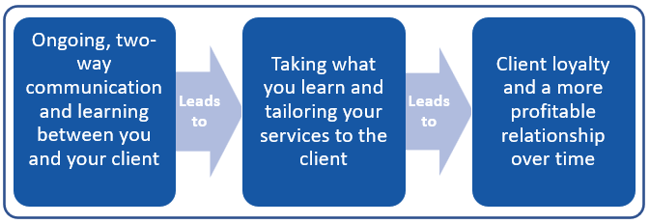If there’s an industry tailor-made for relationship marketing, it’s financial services. For accounting and bookkeeping firms in particular, three simple truths explain why your clients crave a lasting relationship with your firm: (1) you’re handling their money and directly linked to their financial well-being, (2) most of them don’t understand the intricacies of what you do, and (3) they really don’t want to have to go looking for a replacement if they don’t like you.
As a service provider, you already have an instinct for relationship building. You just need to translate that instinct into repeatable, measurable activities that create a brand story so formidable it does the hard work of marketing for you, year after year.
The basics of relationship marketing
Relationship marketing has been around for as long as businesses have known that customers will keep coming back when they like and trust you—and better yet tell their friends about you. But digital marketing and social media have cranked up the need for it (i.e., more competitors are reaching out to your clients) and at the same time created new pathways to build and strengthen bonds with both existing clients and prospects.
While relationship marketing is primarily focused on deepening your connection to existing clients for loyalty and repeat business, digital marketing makes it easier to start and nurture relationships with prospective clients through content you put in front of them. Your relationship marketing strategy will differentiate clients from prospects—the communication channels you use, the frequency of contact, the content, the follow-up activities--although some channels and content can serve double duty for both.
The thinking behind relationship marketing can be broken down into this simple formula:

From this formula, you can start to see some of the foundational elements of your relationship marketing strategy:
- A systematic way to manage regular, two-way communications with prospects and clients. Today’s CRM technology makes this easier than ever.
- Client education, to help them learn from you. When you share your expertise with clients and prospects in a way they can easily digest, they learn to value and respect your knowledge while becoming better consumers of your services.
- Actions based on what you learn about them. By building your clients’ knowledge, they’re in a better position to offer meaningful suggestions for how you can improve your offerings—both for them individually and your entire client base. But you have to actually take the action, or you’ll lose their trust, and the entire exercise becomes pointless.
The real objective behind each of these components is to add value at every client interaction, no matter the channel of communication. It doesn’t take a huge budget to do this, but it does require commitment and the ability to take the long view of your client relationship. Relationship marketing is a mindset, not a one-off “campaign.”
How relationship marketing benefits your firm
Many accounting and bookkeeping firms rely on a relatively small number of high-value clients. That’s why it’s so important to keep them happy and to showcase to prospective clients why they’ll be happier with you over your competitors. Better yet, let your loyal clients do your marketing for you through word-of-mouth—the Holy Grail of marketing ROI.
Going back to our three-part formula, consider how relationship marketing benefits your business:
Ongoing, two-way communication and learning: The information and deep level of understanding you have about your clients and their needs enable you to improve your services, strengthen your value proposition, and stand apart from the competition.
Services tailored to the client: When clients see your understanding of their needs reflected in your service offering, they’re less likely to want to start the relationship over with one of your competitors—even if that competitor offers them a lower cost.
Client loyalty and a more profitable relationship over time: You’ve probably heard that acquiring new customers costs 5 to 10 times more than selling to a current customer. That probably still holds true, but the new thinking is to focus on the customer’s lifetime value. It’s less about pinning a cost to it and more about future value. Plus, if you add more services in the future, your loyal customers are more likely to try them.
Checklist: Make these elements part of your relationship marketing strategy
Wherever you are in your relationship marketing and brand-building journey, make sure you’re sticking to the fundamentals of relationship marketing:
✓ Technology and data tracking. Cloud-based technology gives you client data in real time that you can use to customize your communications with clients; plus, you can gather, analyze, and use the data to improve the overall client experience. Depending on the size and expertise of your internal team, you might need to seek outside help.
✓ Content marketing strategy. Content is critical to relationship marketing. Offer valuable, educationally-based content (not “salesy”) that’s presented in a way that interests and engages your audience. Match the communication channel to the message—think free webinars, blogs, helpful charts you can post on social media and e-mail, and how-to videos.
✓ Customer support team. Make sure your customer support team, however large or small, is fully engaged in your relationship marketing strategy--If you’re using social media, make sure they know how to craft and handle responses; seek their ideas on content creation (FAQ’s, customer success stories, etc.); make sure they’re following your messaging and tone.
✓ Emotion, personality, and tone. You and your colleagues have a personality and so should your brand. Be authentic and likeable. Social media (when done right) is a great way to help clients and prospects get to know and trust the people in your company.
Your clients and prospects are already primed for a meaningful relationship with you, and whether formally or informally, you’re already conducting relationship marketing. Finding ways to strengthen, codify, and expand your activities through the many tools and resources available today will prove well worth the investment.
.png?width=150&height=63&name=TWRlogo-regmark_blueblack%20(1).png)
.png)










Do you have questions about this article? Email us and let us know > info@woodard.com
Comments: